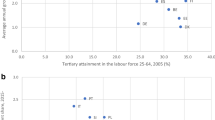Abstract
Projections ten years ahead are made of employment of university educated workers by field of study and of corresponding educational flows. On the demand side, projections are based on trends of sectoral output, productivity and occupational composition. On the supply side, projections rely on first year enrollments/graduates ratios by educational department.
In a decade, new job seekers are found to be twice as many as new job openings. By 1995, about 15 per cent of the total stock of graduates will have to accept ‘non-appropriate’ jobs, presumably at relatively low wages.
The Greek public sector, as a heavy subsidizer of higher education and as the major employer of graduates, plays a decisive role in sustaining imbalances. In conclusion, some policy implications for reducing imbalances are highlighted.
Similar content being viewed by others
References
Ahamad, Bashir and Blaug, Mark (eds.) (1973). The Practice of Manpower Forecasting: A Collection of Case Studies, Elsevier Scientific Publishing Co., Amsterdam.
Baldridge, J. V., Kemerer, Frank R. and Green, Kenneth C. (1982). Enrollments in the Eighties: Factors, Actors, and Impacts, Washington DC: American Association for Higher Education.
Blaug, Mark (1970). An Introduction to the Economics of Education, Allen Lane Penguin Press, London.
Bowles, S. (1969). Planning Educational Systems for Economic Growth, Cambridge Mass: Harvard University Press.
Dore, Ronald and Oxenham, John (1984). ‘Educational Reform and Selection for Employment - An Overview’, in Oxenham, John (ed.), Education Versus Qualifications, George Allen and Unwin, London.
Freeman, Richard B. (1976). The Overeducated American, Academic Press, New York.
Ginzberg, Eli (1979). Good Jobs, Bad Jobs, No Jobs, Harvard University Press, Cambridge Mass.
Glytsos, Nicholas P. (1977). Manpower Requirements and the Educational System in Greece. Report for the Project of Post-secondary education in Greece (Directed by G. Psacharopoulos and A. Kazamias, Athens, December 1977) (in Greek) (in ‘collaboration’ with R. Fakiolas).
Harbison, Frederick (1962). ‘Human Resources Development Planning in Modernizing Economies’, International Labour Review 85, 435–458.
Kanellopoulos, K. N. (1986). Income and Poverty in Greece: Determining Factors, Centre of Planning and Economic Research, Studies series, No. 22, Athens (in Greek).
Karmas, C., Kostakis, A. and Dragonas, T. (1986). Confronting an Uncertain Future: Occupational Demand and Work Values of Educated Greek Youth, Centre of Planning and Economic Research, Athens, February, Draft Copy.
Kintis, Andreas (1980). Higher Education in Greece, Gutenberg, Athens.
Lecht, L. A. (1968). Manpower for National Objectives in the 1970's, Washington DC: National Planning Association.
Lewis, W. Arthur (1962). ‘Education and Economic Development’, International Social Sciences Journal 14, 685–699.
Lewis, P. E. T. and Vella, F. G. M. (1985). ‘Economic Factors Affecting The Number of Engineering Graduates in Australia’, Australian Economic Papers 24(44), 66–75.
Moore, P. G. (1983). ‘Higher Education: The Next Decade’, Journal of the Royal Statistical Society 146 (3), 213–229.
Oxenham, John (1984). ‘Employers, Jobs and Qualifications’, in Oxenham (ed.). Education versus Qualifications? George Allen and Unwin, London.
Parnes, H. S. (1962). ‘Manpower Analysis in Educational Planning’, in OECD, MRP, Planning Education for Economic and Social Development (edited by H.S. Parnes), Paris.
Pissarides, C. A. (1982). ‘From School to University: The Demand for post-compulsory Education in Britain’, Economic Journal 92 (367), 654–667.
Psacharopoulos, G. (1987). ‘Higher education in Greece: Status and Prospects’. Paper presented at the Symposium Higher Education and Research in Greece MIT (mimeo).
Rumberger, Russel W. (1981). Overeducation in the U.S. Labour Market, Praeger, New York.
Souris, P. (1985). ‘Reinsertion of Scientific Manpower in Greek Labour Market after Completion of Post-Graduate Studies Abroad’. Preliminary Text, mimeo November (in Greek).
Teichler, U. and Sanyal, B. C. (1982). Higher Education and the Labour Market in the Federal Republic of Germany, Paris, the UNESCO Press.
Tsang, M. C. and Levin, H. M. (1985). ‘The Economics of Overeducation’, Economics of Education Review 4 (2), 93–104.
Tsoukalas, C. (1983). ‘Social implications of the public sector as employer in the Post-war Greece’, Greek Review of Social Research 50, 20–52 (in Greek).
Wabe, J. Stuart (1974). ‘Practical Difficulties in a Manpower — Forecasting Exercise’, in Wabe, J. S. et al. (eds.), Problems in Manpower Forecasting, Saxon House/Lexington Books, England.
Wéry, R. (1978). ‘Manpower Forecasting and the Labour Market’, International Labour Review 117 (3), 331–342.
Woodward, V. H. (1975). ‘Occupational Trends in Great Britain 1961–1981’, Department of Applied Economics, University of Cambridge, mimeo, 62–75.
Author information
Authors and Affiliations
Rights and permissions
About this article
Cite this article
Glytsos, N.P. Anticipated graduate job mismatches and higher education capacity inadequacies in Greece. High Educ 19, 397–418 (1990). https://doi.org/10.1007/BF00137005
Issue Date:
DOI: https://doi.org/10.1007/BF00137005



